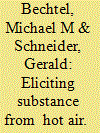| Srl | Item |
| 1 |
ID:
095022


|
|
|
|
|
| Publication |
2010.
|
| Summary/Abstract |
The results of deliberations in multilateral fora are often considered ineffective. Decision making in the European Union (EU) and in particular its key intergovernmental body, the European Council, poses no exception. Especially in the domain of EU foreign and security affairs, the unanimity requirement governing this institution allegedly allows nationalist governments to torpedo any attempt to build up a credible European defense force and a unified foreign policy stance. In this article, we take issue with the claim that multilateral summits merely result in "hot air" by looking at whether and how decisions made during EU summit meetings affect the European defense industry. We argue that investors react positively to a successful strengthening of Europe's military component-a vital part of the intensified cooperation within the European Security and Defense Policy (ESDP)-since such decisions increase the demand for military products and raise the expected profits in the European defense industry. Our findings lend empirical support to the view that financial markets indeed evaluate the substance of European Council meetings and react positively to those summit decisions that consolidate EU military capabilities and the ESDP. Each of the substantial council decisions studied increased the value of the European defense sector by about 4 billion euros on average. This shows that multilateral decisions can have considerable economic and financial repercussions.
|
|
|
|
|
|
|
|
|
|
|
|
|
|
|
|
| 2 |
ID:
087007


|
|
|
|
|
| Publication |
2009.
|
| Summary/Abstract |
When the European Union started its Common Foreign and Security Policy (CFSP), it left the elaboration and implementation of decisions having defense implications for the Western European Union (WEU) for the next six years. NATO partners Norway, Iceland, and Turkey were invited as "associate members," enabling them to participate in the activities and regular meetings of the WEU Council. This paper argues that the WEU arrangement could serve as an example for an interim arrangement for areas of mutual interest. After an examination of past practice on CFSP and European Security and Defense Policy (ESDP), the paper formulates possible future options not only in the security field but also in energy, justice, and home affairs in combating organized crime, a new "economic zone," and the implications of the EU Neighborhood Policy, where institutional and practical arrangements might serve as milestones in the negotiating process without detracting from the ultimate objective of full membership.
|
|
|
|
|
|
|
|
|
|
|
|
|
|
|
|